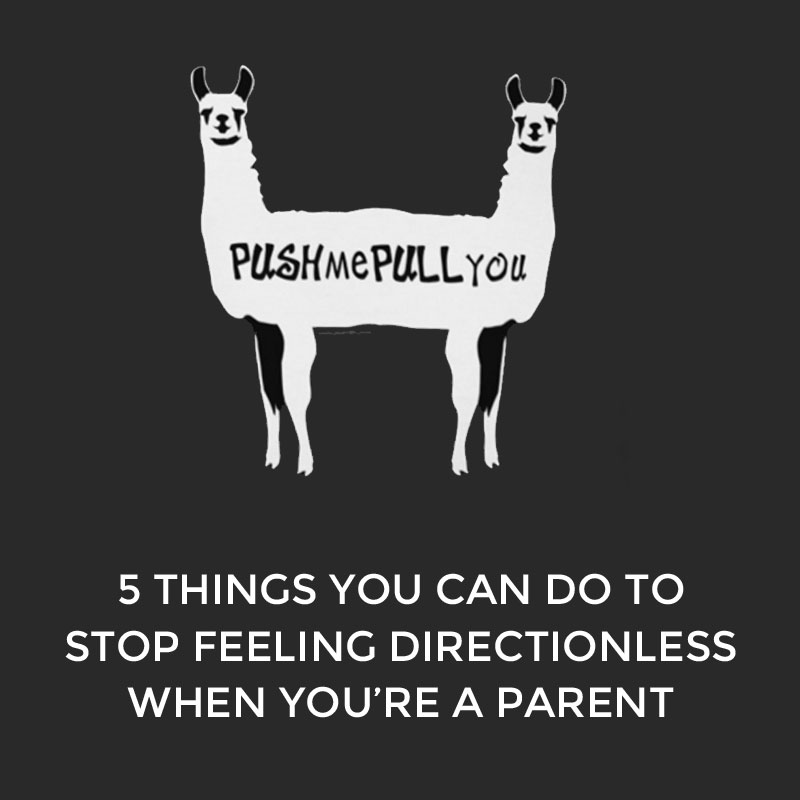Hello there! As you know I’m in book writing mode this month so have lined up some special guests for the blog. Today I have the very excellent Ellen from Potential Psychology sharing her thoughts on a rather big topic: how to stop feeling a bit directionless and out of control when you’re a parent. It’s a topic I’m often asked to write on and I asked Ellen to tackle it because I knew she’d do a better job than me. And she has! Here’s Ellen.

Image credit: zazzle.com.au/jguttm20
Hands up who feels like a pushmi-pullyu.
Kids pushing you one way, work and business pulling you the other. The house needs tidying, there’s a birthday party to organise and a school project that needs to be done. You said you’d help to organise the footy club fundraising trivia night and drive your mother-in-law to her specialist appointment. You’re behind with your accounts, you’re down to the emergency UHT milk supply and the houseplants haven’t been watered for weeks and are wilting in corners in an accusatory manner.
Such is life today!
And where are you in all of this? You know, the real you. The ‘you’ who once had only to focus on yourself. On your work, your sleep, your bank balance, your fitness and your desire to have a cup of tea in solitude. The ‘you’ who took lunch breaks with friends. The ‘you’ who went shopping for you. The ‘you’ who had plans and goals and a clear sense of self.
I don’t know about you but when I became a parent I had no idea just how much my life would change. And I’m not talking just those first few weeks or months of newborns and sleepless nights either. This is a transition that has taken place over years. My life with a seven and four year old is different to the life I had with toddlers and it will be different again when they’re 13 and ten. It’s a great life but it’s one that can take on a life of its own, leaving you – the real you – left behind in your pre-kids days.
So what do you do to prioritise yourself in the midst of this? How do work out who you are now? The real you. Not the pushmi-pullyu. How do you stop feeling so out of control and directionless? How do you regain that sense of self?
Positive Psychology, the science of human flourishing and my favourite flavour of psychology, gives us some tips.
1. Know your ikigai
No, it’s not a small car, it’s the Japanese concept of ‘reason for being’. It describes the things that make life worthwhile and it’s very personal. Knowing your ikigai is believed to bring you satisfaction and meaning, which is consistent with what we’re learning about purpose; that those who have it tend to be more content.
Psychologists define purpose as a central, self-organising life aim. It’s self-organising because it provides a framework for what we do and why we do it each day. Knowing your ikigai can help put you back in control.
But how do you find it? Time for tips two to five…
2. Create your vision
In coaching psychology (the application of positive psychology) we work with people to develop their ‘fuzzy vision’ of the future. A ‘fuzzy vision’ is a kind of goal for those of us who don’t really know our goals yet. It’s a practice of sitting quietly and mentally projecting yourself forward two, three or maybe four or five years ahead. It’s an opportunity to imagine what your ideal life might look like at that juncture. You don’t have to get the details perfect. It doesn’t even have to seem vaguely probable or possible right now. Just consider where you might be living, what you might be doing, who might be around you, what you might have achieved and how you’d like to be feeling. Dream big. Dream expansively. Let go of real life. Write some notes and put it aside for later.
3. Discover your strengths
A whole lot of really exciting studies have been conducted on strengths and how knowing yours and using them regularly can invigorate and inspire you in the way that we all yearn to be invigorated and inspired each day. Your strengths are your built-in capacity for certain thoughts, feeling and behaviour. A little like your Myers-Briggs profile. Your strengths are ways of interacting with the world and doing things that you’re good at and that give you energy. Your particular set of strengths is unique to you and there is a free and easy way to get a fix on them. Try this questionnaire. It’s developed by expert positive psychologists. You’ll have to register but they won’t send you spammy email.
4. Take action
Dreams don’t work unless you do. (You already know that right?) It’s true. I’m a big believer in introspection to get to know ourselves and what we want from life but there’s a point at which we need to stop investigating and thinking and just start doing. The good news is that the doing can be done in tiny increments that you can fit into your busy schedule. In fact, self-awareness is best undertaken slowly and gradually. It’s not for crammers.
So here’s your homework: Once you’ve got your ‘fuzzy vision’ and you know your strengths make a note of one small thing that you can do this week – a teensy little goal that you’d like to achieve – that takes you a step closer to your fuzzy vision, that maybe uses your strengths, and that makes you feel like you are moving forward with purpose. It might be a conversation, ten minutes of research, enrolling in a course or just writing a non-domestic to-do list. It doesn’t matter what it is. Just take the time to think, plan and do.
5. Prioritise yourself
The biggest challenge for the pushmi-pullyu parent is prioritising yourself. If you’ve hung out in the corporate world or done much reading on productivity you probably know the Urgency/Importance Matrix. But do you apply it to yourself?
There is a lot that’s urgent in our lives; family needs, household needs and work needs but your well-being, your sense of satisfaction and your ability to remain sane and in control is important. If you fall apart, so does everything else. So take the time – make the time – to work on your ikigai. It will be worth it. I promise.
—-
My little duty of care caveat: If you’re really not feeling like yourself and haven’t been for a number of weeks or you’re experiencing symptoms or anxiety or depression please see your GP. He or she can assess the situation and refer you to a psychologist if need be.
—-
 Ellen is a psychologist, author and mum. Melbourne-born, she spent most of her 20s and 30s in Sydney and now lives in beautiful Ballarat. Ellen coaches and writes for working mums who want to fulfil their potential. She’s about to launch her first online course ‘Find Your Groove’. Ellen also runs a workplace consultancy business helping business owners and managers to solve their people problems and make work run smoothly.
Ellen is a psychologist, author and mum. Melbourne-born, she spent most of her 20s and 30s in Sydney and now lives in beautiful Ballarat. Ellen coaches and writes for working mums who want to fulfil their potential. She’s about to launch her first online course ‘Find Your Groove’. Ellen also runs a workplace consultancy business helping business owners and managers to solve their people problems and make work run smoothly.
On an average day Ellen coaches, consults, writes, attends meetings, writes some more, hangs washing out, does school pick up, posts pictures on Instagram, reads and feeds the chooks. She shares her home with one big boy and two little ones.

